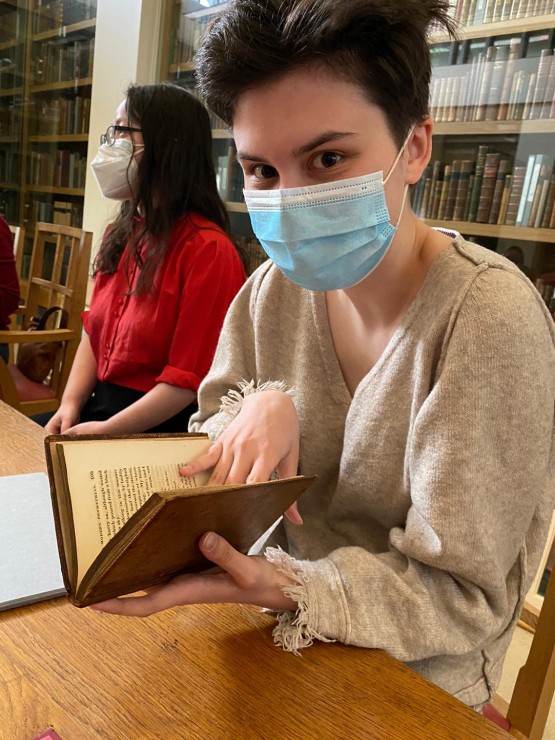The Kenyon-Exeter Program offers you a once-in-a-lifetime chance to study with British students and faculty at a top-ranked British university even as you enjoy the focus, intensity, and intimacy of a Kenyon-style seminar under the familiar guidance of a member of the Kenyon English Department. The range of curricular options at the University of Exeter is complemented by the Kenyon-Exeter seminars expansive schedule of world-class theater and co-curricular travel. Imagine exploring this whole new world of educational opportunity with friends from home.
The Kenyon-Exeter Experience

For more than forty years, Kenyon students have travelled to southwest England as part of this yearlong program. At the University of Exeter, students enjoy full access to classes in the Department of English, part of the larger College of Humanities, which also houses the departments of archaeology, art history and visual culture, Classics and history, drama, film, modern languages and theology. Students also enroll in a seminar taught by their Kenyon professor; the seminars syllabus capitalizes upon the opportunity for cultural and travel experiences in Britain, which are sponsored and funded by the program.
Program Details
The Kenyon-Exeter program combines the best of two academic systems — the rich curricular options of a top British university and the intimacy of a liberal arts seminar taught by a member of the Kenyon faculty. Each semester Kenyon-Exeter students enroll in two University of Exeter classes, which allow them to work intensively alongside British and international counterparts, with the Kenyon-Exeter Seminar constituting an additional course each semester. Some students may even return to Gambier with more than the 4.0 units of credit that comprise a "full load" at Kenyon.
Kenyon English majors typically enroll in four courses each year — two per semester — drawn from the University of Exeter’s undergraduate course catalogue. Most choose three courses (or “modules”) in the Department of English (which can include film studies and creative writing as well as literary studies) and a fourth course from another department. Because Kenyon enjoys a long-standing relationship with Exeter’s Department of English, we can ensure that the English courses undertaken in Exeter will integrate fully and well into the Kenyon English major. For example, creative writing courses taken at UEx can count towards the Kenyon emphasis in creative writing, and all of the marks earned in Exeter’s Department of English will be factored into the Kenyon GPA, distinguishing the program from other study abroad options. More information about the Department of English programs, faculty and curriculum can be found at humanities.exeter.ac.uk. (To navigate to specific course lists click “Modules in Exeter” on the left of the screen and choose “Level 2 modules” or “Level 3 modules.”)
While for most students, the focus of their coursework at Exeter will likely be English, Kenyon students have also taken courses in drama, classics, theology, biology, psychology, politics, history, Spanish, French and Italian. For all students, including those whose major isn’t English or who are double majors, the Kenyon resident director will be available to advise about course choices across the University. And, of course, the RD will also be available to assist with transition issues and to help students find the appropriate academic and psychological support, should personal or academic problems emerge.
Because the British academic semester is shorter, many Kenyon-Exeter students find Exeter courses more briskly paced and intensively focused than courses they have undertaken in Gambier. Kenyon-Exeter students have typically thrived on this challenge, enjoying increased opportunity for independent research and secondary readings connected to the course’s primary syllabus. They find the difference in British university culture an exciting opportunity to cultivate new intellectual skills — to learn independently, to develop greater autonomy and self-direction in their research and creative projects. Thus many Kenyon-Exeter students return to Gambier eager to pursue Honors in English — and well-prepared to do so.
Informed by a liberal arts pedagogy and dedicated exclusively to Kenyon students, the Kenyon-Exeter seminar fosters the sort of dynamic but intimate academic community familiar to those who have studied in Gambier. The 2025-26 Kenyon-Exeter Seminar will focus on two different themes: “Plays in Production" in the fall semester and "Literature and Landscape" in the spring semester.
Kenyon-Exeter students will be required to arrive in Exeter a few days before the beginning of the autumn term for orientation (or “Freshers’ Week”). The university will notify accepted students of the exact dates for this orientation during the preceding summer, but typically it commences one week before the beginning of term. The term dates for 2023-24 are as follows:
Autumn Term: Sept. 23, 2024-Dec. 13, 2024
Spring Term: Jan. 5, 2025-March 28, 2025
The University of Exeter website notes that “The dates given above are for standard University terms: however, for some programmes the dates of required attendance may vary.” One peculiarity of Exeter’s term system is that the final assessment for each term takes place during the first week of the subsequent term; for example, final essays for autumn term may be due at the end of the first week of the spring term; examinations for some spring term modules may take place during the summer term. Thus, while Kenyon-Exeter students attend classes only in autumn and spring terms, they may need to extend their residency briefly into the summer term in order to submit their final coursework and finish co-curricular travel.
Careful guidance about accommodations at the university helps Kenyon-Exeter students integrate well and quickly into their new environment. Kenyon students stay in self-catering flats, where they enjoy a private room but share kitchens and common rooms with other British and international undergraduates. Program fees cover a room in a Kenyon-approved flat; students who elect to live in more expensive housing may do so but must pay the extra fees. Final application for a room is made when the student accepts a place at the University (late spring/early summer). Undergrad flats are let for a 40-week period that covers the entirety of the Kenyon-Exeter Program (including vacations). Living in halls or University-owned flats al lows easy access to campus activities and ready contact with British students. Moreover, much of Exeter’s student housing is new or recently renovated.
Take a virtual tour of some of the Exeter housing options at exeter.ac.uk/undergraduate/life/accommodation.
Students participating in the Kenyon-Exeter program will pay Kenyon College tuition, room and board. This payment will cover Exeter tuition, a meal credit, and a room in a Kenyon-approved flat. Students who wish to live in more expensive housing may do so, but must pay the extra fees.
A non-refundable $500 deposit is due approximately two weeks after acceptance by Kenyon into the program. Kenyon provides a meal credit to each participant, applied as a credit to their Kenyon bill.
The tuition for the Kenyon-Exeter Program covers all group excursions, course-related travel and theater tickets, internet access in student residences, an allowance for joining Exeter student societies, SIM card, a discounted national train pass and some phone top-up costs.
Expenses for which the individual is responsible include transatlantic transportation; transportation from London to Exeter and back (at the beginning and end of the academic year); books; personal living expenses (e.g., laundry, mobile phone costs after the first top-up); food expenses beyond what the meal credit will cover; and independent travel expenses.
For the purpose of scholarships and loans, Kenyon-Exeter students are considered full-time Kenyon students. Kenyon College financial aid is automatically transferable to the Kenyon-Exeter Program. Students should contact the Center for Global Engagement for detailed information on how their financial aid package will be applied towards program payments.
Matt Suazo joined the English faculty in 2016. He specializes in hemispheric American literature, early and nineteenth-century, and his courses at Kenyon speak further to his overlapping interests in authorship, postcolonial studies, the environment, and multi-ethnic U.S. literatures.
His current book project — "Wetland Americas: Literature, Race and the Mississippi River Valley in Translation, 1542-1884" — explores the circulation of discourses of race and environment within the U.S. and around the Atlantic World. In 2019, he completed work on this project as an AAS-National Endowment for the Humanities Long-term Fellow at the American Antiquarian Society.
He recently published a chapter in "Swamp Souths: Literary and Cultural Ecologies" (LSU), has another essay forthcoming in "Neither the Time Nor the Place: Today’s Nineteenth Century" (U Penn), and his academic writing has also appeared in boundary 2. While a Ph.D. student in literature and American studies at the University of California, Santa Cruz, his awards included a dissertation-year fellowship from the Humanities Institute, and he was honored by selection to the University of California President’s Society of Fellows. He has also held research fellowships at the John Carter Brown and Newberry Libraries.
Suazo came to Kenyon after teaching English at San Francisco State University, and he has also taught literature and first-year writing at UCSC and the University of New Orleans.
My experience at Exeter makes me smile nearly every day. The friends, the food, the reading and the traveling all make up this beautiful life you get to build there. As a third-year student at a British university, you have a fair amount of freedom in choosing your interests and emphasizing different areas of study. The professors are incredible and you have Kenyon faculty right by your side.
Snapshots from Kenyon-Exeter 2021-2022








At the University

The City of Exeter and Environs

Exeter was a wonderful and eye-opening education and cross-cultural experience. The program was a beautiful complement to my Kenyon experience. I had the privilege of learning to love both communities and eventually integrate both of them into my life abroad and afterward.
